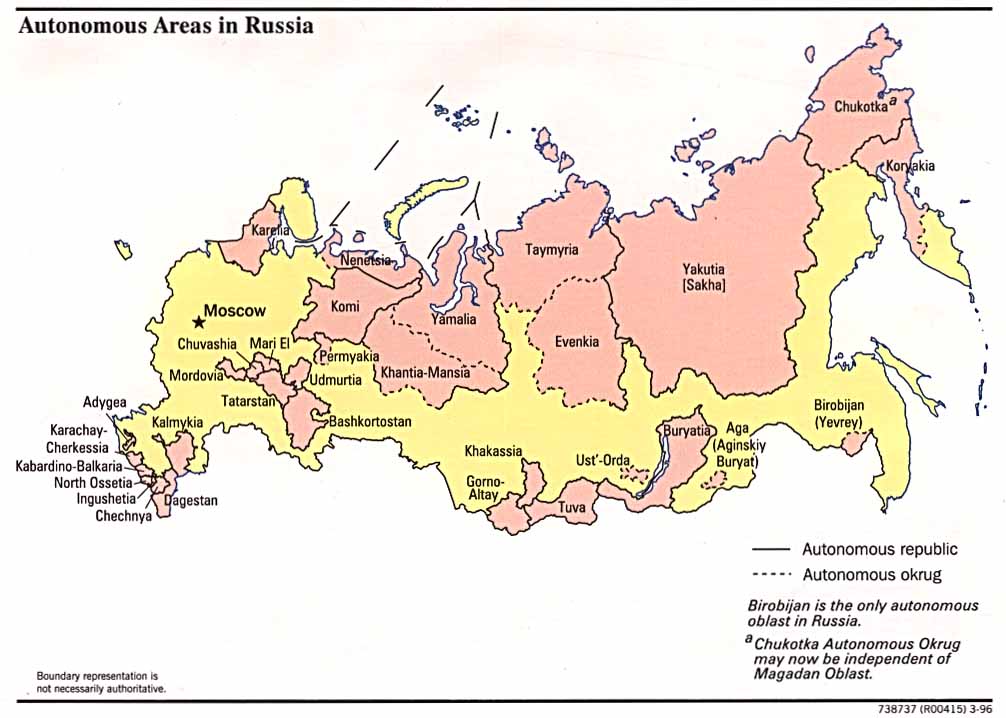
Tatars and Russia (thread)
Last time I discussed history of Golden Horde and Idel Ural and stopped around y. 1400
Today I will talk of post-Horde Tatar-Russian interferences, especially regarding institutions and politics. Which is much more interesting
Last time I discussed history of Golden Horde and Idel Ural and stopped around y. 1400
Today I will talk of post-Horde Tatar-Russian interferences, especially regarding institutions and politics. Which is much more interesting

Question - when did Russia stop paying tribute to Tatar Khanates? Usual answer is - y. 1700 when Peter I stopped paying to Crimean Khanate. This is true factually, but not legally. Legally Moscow never recognized it's paying tribute to Bakhchisaray, calling it "gifts" (гостинцы) 

So Russia never recognized that its regular payments to Crimea are the tribute. Meanwhile, the payments from Moscow to a microscopical Qasimov Khanate that continued till it's formal abolishment in 1681 were formally called tribute "выход" in Russian sources. That's Qasimov 

And that's territorial expansion of Russia in 17th c. Green - territory by 1600, orange - by 1700. And this state technically paid tribute to a microscopical polity, which ofc was 100% dependant by that point and had very little actual autonomy. Why? Let's go deeper in history 
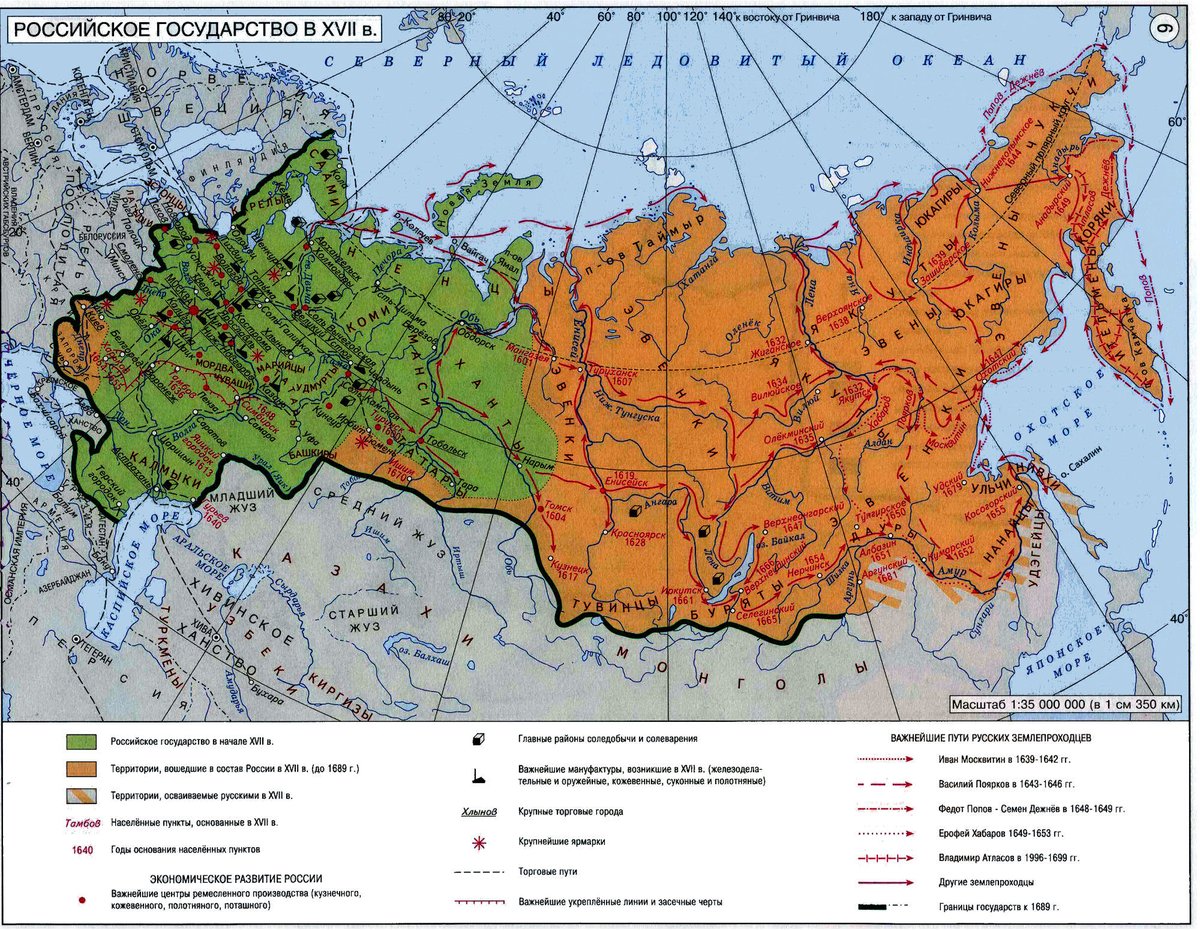
As I told in precious thread, after Tamerlane's invasion old cities of Bulgaria laid in ruins and were never rebuilt. Instead an obscure border fortress of Kazan rose as the new urban center - largely due to its relative isolation from Volga, granting certain security 
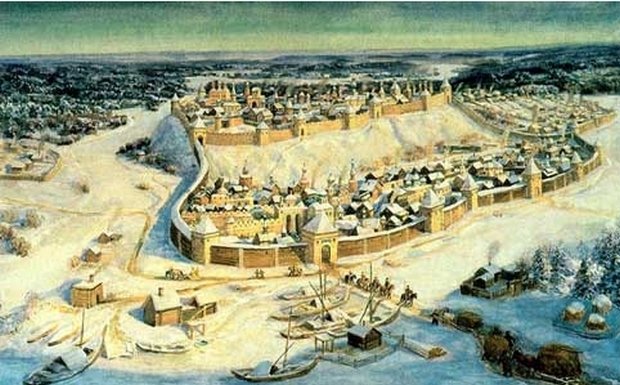
So an overthrown Khan of the Golden Horde Ulug Muhammed decided not to fight for return of his old throne. Instead he escaped to Kazan to carve out a new fief fir himself and his descendants 

That was typical for this age. With Golden Horde gradually disintegrating, elite groups were carving out new states out of its ruins. "Большая орда" here is basically what remained of the Golden Horde, while Kazan, Astrakhan, Crimea, Siberia and Kazakh Khanates are separatists 

He mistakenly believed that the Grand Duc of Moscow Vasily would be his ally. In the fight for succession over Moscow between Vasily and his uncle Yurii of Zvenigorod (Moscow feudal war), Ulug Muhammad as the Khan of the Golden Horde had made a decision in favour of Vasily 

But Ulug Muhammad found out that Vasily doesn't consider himself in debt at all. Instead Vasily wanted to prey off his new weakness. So Vasily waged a war against Ulug Muhammad. However, in the Suzdal battle 1445 Vasily's forces were destroyed and the price himself captured 

As a result Ulug Muhammad imposed heavy conditions on Vasily, regarding monetary contribution, imposition of tribute to Kazan and also a creation of a fief for Ulug Muhammad's son Qasim on Moscow territory. Which would be later known as the Qasim Khanate/Tsardom (царство) 
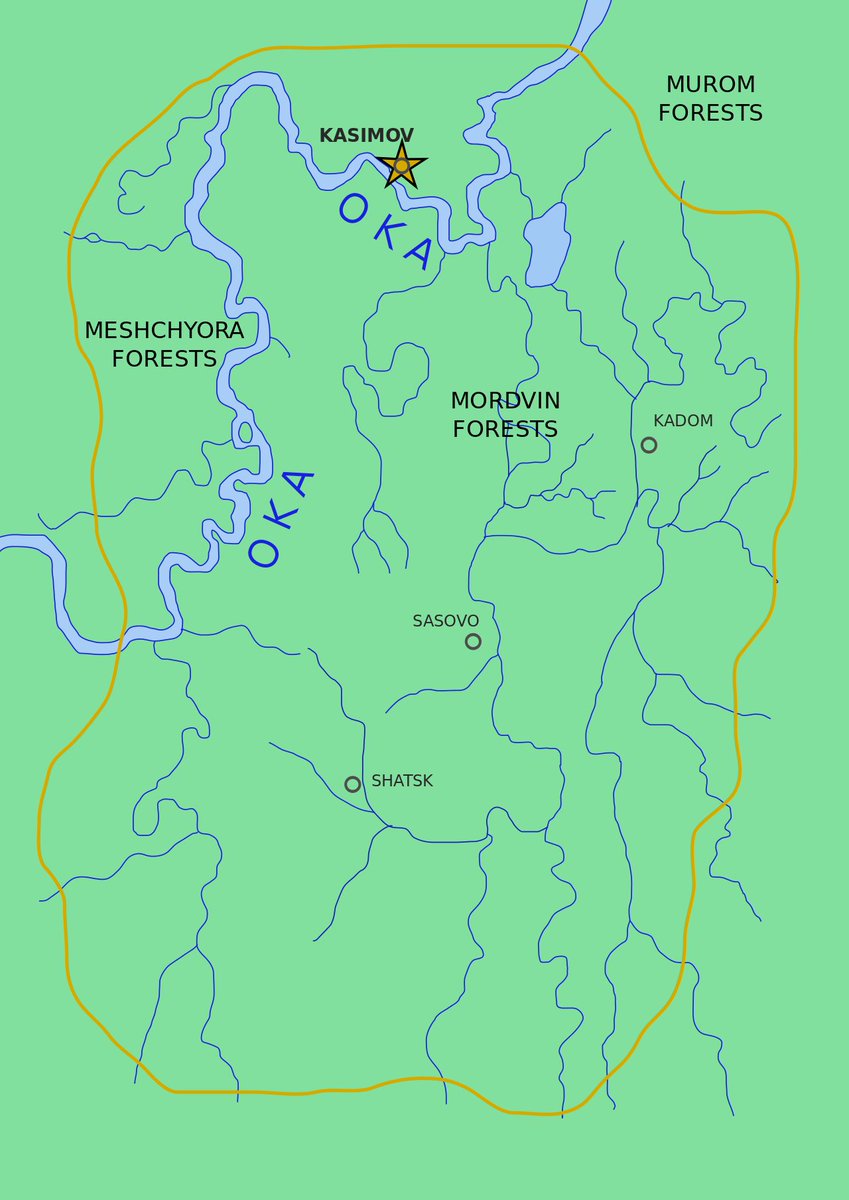
That's an important point for understanding the roots of Moscow political ideology, especually idea of Tsar. While we conceptualize polities of Kazan, Crimea, Siberia etc as "Khanates" in Russian sources they are all called "Tsardoms" (царство). Why? 

Originally the word Tsar (царь) was the Russification of "Caesar". So Tsar = Roman Emperor or an emperor of successor state. Byzantium, HRE (in 18th c Russian docs Austrian troops r called цесарцы, Tsar's men. Habsburg in Vienna = Tsar), the Ottomans 

So for early Russia the idea of Tsardom linked to the succession from Rome. But with Mongol conquest Russia was included to the Mongol political system. And Mongols like other Inner Asian cultures, greatly valued the idea of bloodline, specifically of sacred royal bloodline 

Under the new order the political legitimacy of the supreme power was based on the succession from Chinghis Khan. Only Khans could rule and only Chinghisids could be Khans. So after the 1230s, Tsar = Khan, and Tsardom = succession state of Mongol Empire 

So by 13th c we have two different ideas of Tsardom. Older one, Tsar = Caesar, Tsardom = Rome. And newer one, Tsar = Khan, Tsardom = Mongols. Former one had more religious significance, latter one - more of political one
Donald Ostrowski argues that this shaped two competing ideas of legitimacy - of church and of state. This may be true or may be not, what is important however is the idea that Tsardom can be won by war, which is raised in Russian sources (e.g. Ivan the terrible's letters)
This can explain two phenomena. First the extreme reverence of Russian rulers to the idea of Tsardom and the Tsar's title. Let's have a look at the correspondence between Moscow and Bakhchisaray. How did Moscow rulers address Khans of Crimea? 

Ivan III (1462-1505) and Vasily III (1505-1533) called Crimean Khan as "the elder brother". They were addressing only sultan's (Khans brothers or nephews of Chingisid blood) as "brothers". So at this time Moscow recognized the superiority of Bakhchisaray in status 

Ivan IV the Terrible (1533-1584) the first Russian tsar sometimes addressed the Crimean Khan as "elder brother" and sometimes just as "brother". That was the first time where Moscow started actually claiming to have the same status as Bakhchisaray 
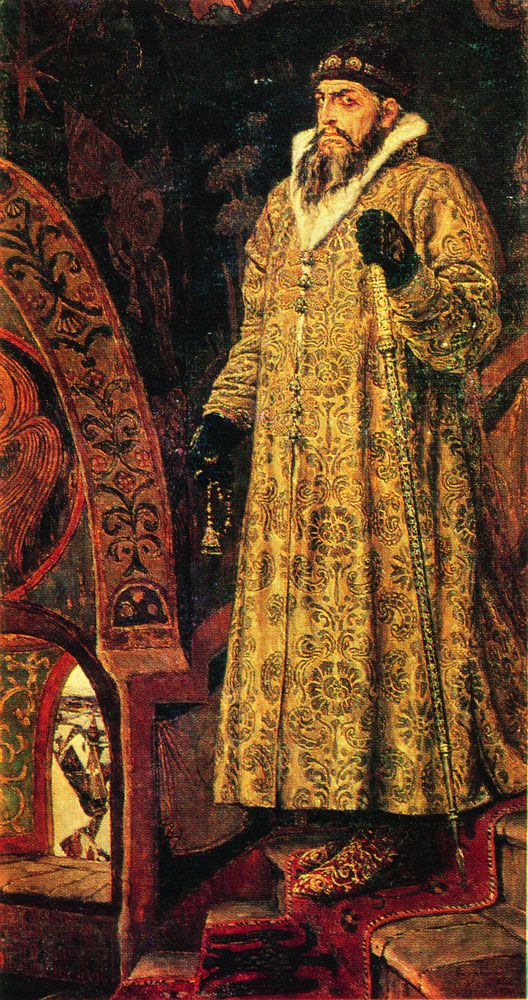
Finally, Romanovs staring from 1613 always addressed the Crimean Khan as "brother". Russia by that time was waaay bigger and more powerful. Which means that the claims for status raised by Moscow lagged very much behind its actual rise in power and resources 

Source & Pochekaev. From vassals to suzerains. Из вассалов в сюзерены. A very good study by a St Petersburg lawyer who studied the diplomatic correspondence of Moscow to trace how it gradually renegotiated its status with its power rising
But let's return to the Kasimov Khanate. Now it is the only such Tatar polity existing as an enclave within Muscovy known to general public. In fact, in 15-16th cc there were tons of them
It was totally normal for a Crimean Khan to write to a Moscow prince like "I have a brother/uncle/cousin could you give him a fief please?" Moscow almost always agreed. As a result there was a constant flow of Tatar aristocracy coming to settle in Muscovy with their retainers
What was their status? That's a tricky question. Initially it was highly privileged. By the late 15th Russian nobility was considered slaves (холопы) of the Moscow prince. Even the Russian word for "sovereign" государь was initially how slaves addressed their owner
So if государь (sovereign) means slave-master, one can deduce from here the etymology of the word государство (state). Will not elaborate
A small detail. How did Russian people address their petitions to the Tsar ? Noblemen called themselves твои холопы, "your slaves". While simple ppl (peasants etc) called themselves твои сироты, "your orphans". Being a slave of the sovereign was the sigh of nobility and status
Originally in middle ages noblemen could switch from one prince to another changing their allegiance (отъезд). However, by 15th c this right died, it was treason. Meanwhile these Tatar immigrants originally could travel there and back
Furthermore, while princes of Moscow addressed these guys as their холопы in letters to the Western rulers (e.g. Polish king) they never called them холопы in their face. Officially they were his guests who could leave at any moment
It started changing very quickly in 1550s. With the conquest of Kazan in 1552 and Astrakhan in 1556 Moscow didn't feel it needs to indulge them anymore. Very quickly within like a decade they were called slaves straight to their faces
Furthermore they lost their right to leave. While previously they could travel back and forth, serve in Russian army, return to Crimea/Nogay Horde and then come again, now it was a one way road. Moscow didn't allow leaving now and their old kin wouldn't accept them back either
After the destruction of Kazan in 1452 the war became way more existential and thus serving in a Moscow army was not considered as a legitimate career for a ppl who wanted to retain their position in Tatar states. If you leave to Moscow, there's no way back anymore
On the Tatar enclaves in Muscovy I recommend Bulat Rahimzyanov. Moscow and the Tatar world Москва и татарский мир. Very good book written on a range of primary sources
The decline in their status didn't mean ofc that they lost wealth or power. They still had lands, owned serfs (who were Orthodox Christian), kept tons of armed retainers. Moscow didn't really interfere much in what they were doing in their estates
Documents of the late 16 c mention these Tatar princes and their men - Tatars, Russians, Latvians, Poles, Germans. The latters ofc are POWs from the Livonian war. Moscow armies enslaved population of Baltic&Poland en masse, so the backwoods of Muscovy became very multicultural
Tatar elites in Muscovy were still rich. However, with every generation Moscow needed them less. First of all, while nomadic troops were absolutely necessary for the rise of Moscow (they basically won the war with Novgorod), the progress of firearms made them not that necessary
Furthermore the status games that Moscow was playing changed. In the 13-16 c Moscow had to affirm itself in the eyes of Tatar polities. In fact if you look at pretty much every negotiation between Tatar states and Moscow, Tatars want cash, Moscow wants recognition of status
But in the 16th c the balance of power shifted enormously and abruptly. Once Moscow destroyed Kazan, Astrakhan and Siberia and Crimea couldn't really fight back, the awe before the Tatar power very much diminished
Meanwhile the interest to the West increased. As the Polish armies smashed Muscovy in the Time of Troubles and even occupied Kremlin, new Moscow rulers wanted to affirm itself against Poland, not against Tatars. So they started copying Poles in pretty much everything
So if old pre-1550 Muscovy is a largely Tatar emulating polity, after 1600 it is a very much Pole-emulating one. But I'll cover it later in another thread
End of thread. However the question remains. It is clear that long Tatar dominance should have left some institutional legacy in Russia. But what legacy exactly? In order to answer this question we need to look how did Tatar political culture function. See you on Thursday
• • •
Missing some Tweet in this thread? You can try to
force a refresh






